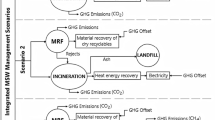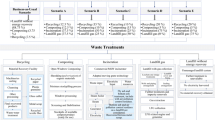Abstract
In China, the continuously increasing amount of municipal solid waste (MSW) has resulted in an urgent need for changing the current municipal solid waste management (MSWM) system based on mixed collection. A pilot program focusing on source-separated MSW collection was thus launched (2010) in Hangzhou, China, to lessen the related environmental loads. And greenhouse gas (GHG) emissions (Kyoto Protocol) are singled out in particular. This paper uses life cycle assessment modeling to evaluate the potential environmental improvement with regard to GHG emissions. The pre-existing MSWM system is assessed as baseline, while the source separation scenario is compared internally. Results show that 23 % GHG emissions can be decreased by source-separated collection compared with the base scenario. In addition, the use of composting and anaerobic digestion (AD) is suggested for further optimizing the management of food waste. 260.79, 82.21, and −86.21 thousand tonnes of GHG emissions are emitted from food waste landfill, composting, and AD, respectively, proving the emission reduction potential brought by advanced food waste treatment technologies. Realizing the fact, a modified MSWM system is proposed by taking AD as food waste substitution option, with additional 44 % GHG emissions saved than current source separation scenario. Moreover, a preliminary economic assessment is implemented. It is demonstrated that both source separation scenarios have a good cost reduction potential than mixed collection, with the proposed new system the most cost-effective one.










Similar content being viewed by others
References
Astrup T, Fruergaard T, Christensen TH (2009) Recycling of plastic: accounting of greenhouse gases and global warming contributions. Waste Manag Res 27:763–772
Banar M, Cokaygil Z, Ozkan A (2009) Life cycle assessment of solid waste management options for Eskisehir, Turkey. Waste Manag 29:54–62
Barton JR, Issaias I, Stentiford EI (2008) Carbon-making the right choice for waste management in developing countries. Waste Manag 28:690–698
Björklund A, Finnveden G (2005) Recycling revisited—life cycle comparisons of global warming impact and total energy use of waste management strategies. Resour Conserv Recy 44:309–317
Boldrin A, Andersen JK, Møller J, Christensen TH, Favoino E (2009) Composting and compost utilization: accounting of greenhouse gases and global warming contributions. Waste Manag Res 27:800–812
Calabrò PS (2009) Greenhouse gases emission from municipal waste management: the role of separate collection. Waste Manag 29:2178–2187
Cherubini F, Bargigli S, Ulgiati S (2009) Life cycle assessment (LCA) of waste management strategies: landfilling, sorting plant and incineration. Energ 34:2116–2123
Consonni S, Viganò F (2011) Material and energy recovery in integrated waste management systems: the potential for energy recovery. Waste Manag 31:2074–2084
Consonni S, Giugliano M, Massarutto A, Ragazzi M, Saccani C (2011) Material and energy recovery in integrated waste management systems: project overview and main results. Waste Manag 31:2057–2065
Council of European Union (1999) Council Directive 1999/31/EC of 26 April 1999 on the landfill of waste. Off J Eur Communities 182:1–19
Craighill AL, Powell JC (1996) Lifecycle assessment and economic evaluation of recycling: a case study. Resour Conserv Recy 17:75–96
Damgaard A, Larsen AW, Christensen TH (2009) Recycling of metals: accounting of greenhouse gases and global warming contributions. Waste Manag Res 27:773–780
Di X, Nie Z, Yuan B, Zuo T (2007) Life cycle inventory for electricity generation in China. Int J LCA 12(4):217–224
Eisted R, Larsen AW, Christensen TH (2009) Collection, transfer and transport of waste: accounting of greenhouse gases and global warming contribution. Waste Manag Res 27:738–745
Finnvedena G, Johanssonb J, Lindb P, Mobergb A (2005) Life cycle assessment of energy from solid waste-part 1: general methodology and results. J Clean Prod 13(3):213–229
Gheewala SH (2003) Application of life cycle assessment to cleaner production. Int Energ J 4(1):5–15
Güereca LP, Gassó S, Baldasano JM, Jiménez-Guerrero P (2006) Life cycle assessment of two biowaste management systems for Barcelona, Spain. Resour Conserv Recy 49:32–48
Hangzhou Municipal Solid Waste Disposal Supervision Center (2010) Hangzhou municipal solid waste physical property analysis and disposal method. Municipal Solid Waste Disposal Supervision Center, Hangzhou (in Chinese)
Hangzhou Municipal Solid Waste Disposal Supervision Center (2011) Assess for the achievement of the municipal solid waste source-separated collection. Municipal Solid Waste Disposal Supervision Center, Hangzhou (in Chinese)
Hellweg S, Hofstetter TB, Hungerbühler K (2001) Modeling waste incineration for life-cycle inventory analysis in Switzerland. Environ Model Assess 6:219–235
Hirai Y, Murata M, Sakai S, Takatsuki H (2000) Life cycle assessment for food waste recycling and management. In: Proceedings of the Fourth International Conference on EcoBalance, Tsukuba, Japan. pp 335–338
Hong J, Li X, Cui Z (2010) Life cycle assessment of four municipal solid waste management scenarios in China. Waste Manag 30:2362–2369
Hopper JR, Yaws CL, Ho TC, Vichailak M (1993) Waste minimization by process modification. Waste Manag 13(1):3–14
International Standard 14040 (1998) Environmental management–life cycle assessment—principles and framework, 1st edn. ISO, Geneva
Khoo HH, Lim TZ, Tan RBH (2010) Food waste conversion options in Singapore: environmental impacts based on an LCA perspective. Sci Total Environ 408:1367–1373
Larsen AW, Merrild H, Christensen TH (2009) Recycling of glass: accounting of greenhouse gases and global warming contributions. Waste Manag Res 27:754–762
Li S (2003) Recycling behavior under China’s social and economic transition: the case of Metropolitan Wuhan. Environ Behav 35:784–801
Liamsanguan C, Gheewala SH (2008a) The holistic impact of integrated solid waste management on greenhouse gas emissions in Phuket. J Clean Prod 16:1865–1871
Liamsanguan C, Gheewala SH (2008b) LCA: a decision support tool for environmental assessment of MSW management systems. J Environ Manage 87:132–138
Lundie S, Peters GM (2005) Life cycle assessment of food waste management options. J Clean Prod 13:275–286
Merrild H, Damgaard A, Christensen TH (2008) Life cycle assessment of waste paper management: the importance of technology data and system boundaries in assessing recycling and incineration. Resour Conserv Recy 52:1391–1398
Merrild H, Damgaard A, Christensen TH (2009) Recycling of paper: accounting of greenhouse gases and global warming contributions. Waste Manag Res 27:746–753
Mohareb AK, Warith MA, Diaz R (2008) Modelling greenhouse gas emissions for municipal solid waste management strategies in Ottawa, Ontario, Canada. Resour Conserv Recy 52:1241–1251
Møller J, Boldrin A, Christensen TH (2009) Anaerobic digestion and digestate use: accounting of greenhouse gases and global warming contribution. Waste Manag Res 27:813–824
Murray R (1999) Creating wealth from waste. Demos, London
Tai J, Zhang W, Che Y, Feng D (2011) Municipal solid waste source-separated collection in China: a comparative analysis. Waste Manag 31:1673–1682
UNEP, OECD, IEA, IPCC (United Nations Environment Programme, Organization for Economic Cooperation and Development, International Energy Agency, Intergovernmental Panel on Climate Change) (1995) The IPCC guidelines for national greenhouse gas inventories. IPCC, Bracknell
Wentzel H, Hauschild M, Alting L (1998) Environmental assessment of products, volume 1: Methodology, tools and case studies in product development. Chapman & Hall, London
Zhao W, Van der Voet E, Zhang Y, Huppes G (2009a) Life cycle assessment of municipal solid waste management with regard to greenhouse gas emissions: case study of Tianjin, China. Sci Total Environ 407:1517–1526
Zhao Y, Wang HT, Lu WJ, Damgaard A, Christensen TH (2009b) Life-cycle assessment of the municipal solid waste management system in Hangzhou, China (EASEWASTE). Waste Manag Res 27:399–406
Acknowledgment
This project is supported by the National Basic Research Program of China (no. 2011CB201506).
Author information
Authors and Affiliations
Corresponding author
Additional information
Responsible editor: Philippe Garrigues
Rights and permissions
About this article
Cite this article
Dong, J., Ni, M., Chi, Y. et al. Life cycle and economic assessment of source-separated MSW collection with regard to greenhouse gas emissions: a case study in China. Environ Sci Pollut Res 20, 5512–5524 (2013). https://doi.org/10.1007/s11356-013-1569-1
Received:
Accepted:
Published:
Issue Date:
DOI: https://doi.org/10.1007/s11356-013-1569-1




